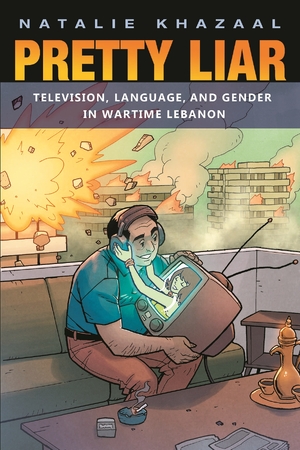"This well-researched and rich monograph concludes correctly that Lebanese television, LBC included, has indeed mostly helped establish a 'new hegemonic order based in consumer culture rather than the breakdown of hegemony.'"—Middle East Journal
"An original, accessible, and welcome contribution to the scant literature on Lebanese television. . . . It is an auspicious reminder that Arab media studies has moved into a new phase, away from general introductions to the field and towards an excavation of rich and specific genealogies."—Marwan M. Kraidy, author of The Naked Blogger of Cairo: Creative Insurgency in the Arab World
"This is a fine work and will be a substantive contribution to literature on Lebanon and on media in the region."—Andrea Stanton, associate professor of Islamic studies, University of Denver
"A well-written, impeccably researched, and groundbreaking study of television in Lebanon during the country’s civil war."—Christopher Stone, author of Popular Culture and Nationalism in Lebanon: the Fairouz and Rahbani Nation
Description
How did a new, irresistible brand of television emerge from the Lebanese Civil War (1975–91) to conquer the Arab region in the satellite era? What role did seductive news anchors, cool language teachers, superheroes, and gossip magazines play in negotiating a modern relationship between television and audiences? How did the government lose its television monopoly to sectarian militias? Pretty Liar tells the untold story of the coevolution of Lebanese television and its audience, and the ways in which the Civil War of 1975–91 influenced that transformation. Based on empirical data, Khazaal explores the rise of language and gender politics in Lebanese television and the storm of controversy during which these issues became a referendum on television’s relevance. This groundbreaking book challenges the narrow focus on present-day satellite television and social media, offering the first account of how broadcast television transformed media legitimacy in the Arab world. With its analysis of news, entertainment, and educational shows from Télé Liban and LBC, novels, periodicals, and popular culture, Pretty Liar demonstrates how television became a site for politics and political resistance, feminism, and the cradle of the postwar Lebanese culture. The history of television in Lebanon is not merely a record of corporate technology but the saga of a people and their continuing demand for responsive media during times of civil unrest.
About the Author
Natalie Khazaal is assistant professor of international studies and Arab culture at Texas A&M University. She studies the role of Arab media in representations of minorities, as well as the role of language and literature in generating media representations. She is a coauthor of Ultimate Arabic.
6 x 9, 344 pages, 13 black and white illustrations
November 2018



